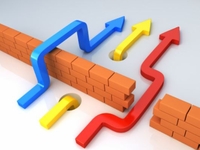Tutorial math and reading software for elementary and secondary arithmetic, basic math, algebra, geometry, precalculus plus GED, ABE, and CLEP preparation for elementary school, high school, college, adult education, and homeschool students.
Learning how to Learn
Product Description
Learning how to learn, also known as metacognition, is a valuable skill that can enhance a learner's ability to acquire knowledge and skills more effectively. There are some strategies to improve the learning process:
Everyone has a preferred learning style. For some people, it's visual, for some auditory, for some it has to be experienced. People who know their learning style can tailor their study techniques accordingly. When I took a German literature class in college, I read the books aloud to myself so I could hear the words and have a better understanding of what I was reading.
It helps to experiment with different methods.
Stay motivated and focused by breaking down large learning chunks into smaller more manageable segments.
The learning environment needs to have minimal distractions preferable using the same location for study sessions.
In language arts, writing down key points in a summarizing fashion helps memory especially reviewing those notes for complete understanding.
In mathematics, learning from a textbook and writing down each problem step by step or taking notes from the lecture is a key advantage to understanding concepts. Just listening to a lecture is not enough for good retention - getting active by taking notes reinforces what is being said.
Take advantage of technology to access a wide range of learning methods. Learn by DOING. Even with technology, write down problems and practice practice practice for complete understanding.
Practice retrieving information. Try to retrieve information from memory. Use flashcards or self-quizzing to test your understanding. Review material repeatedly over time, to reinforce long-term retention.
Adopt a sense of curiosity and explore new topics. Ask questions, seek different perspectives, and think critically about the information you encounter. Connect new knowledge with existing knowledge to deepen understanding.
Seek feedback from teachers, mentors, or peers. Write down the topics that need improvement and work on those.
Develop self-discipline and self-motivation. Find strategies to overcome procrastination and stay committed to learning goals.
Take care of your physical and mental well-being. Get enough sleep, maintain a balanced diet, and engage in regular exercise to optimize your cognitive functioning. Manage stress effectively through relaxation techniques or mindfulness practices.
Learning is a lifelong process and everyone learns differently. Be patient, experiment with different learning methods, and continuously refine the approach that works best.
And, what REALLY helps is teaching someone else! Being able to convey concepts in an understandable way to another person reinforces concepts for both learners.
Related articles:
Everyone has a preferred learning style. For some people, it's visual, for some auditory, for some it has to be experienced. People who know their learning style can tailor their study techniques accordingly. When I took a German literature class in college, I read the books aloud to myself so I could hear the words and have a better understanding of what I was reading.
It helps to experiment with different methods.
Stay motivated and focused by breaking down large learning chunks into smaller more manageable segments.
The learning environment needs to have minimal distractions preferable using the same location for study sessions.
In language arts, writing down key points in a summarizing fashion helps memory especially reviewing those notes for complete understanding.
In mathematics, learning from a textbook and writing down each problem step by step or taking notes from the lecture is a key advantage to understanding concepts. Just listening to a lecture is not enough for good retention - getting active by taking notes reinforces what is being said.
Take advantage of technology to access a wide range of learning methods. Learn by DOING. Even with technology, write down problems and practice practice practice for complete understanding.
Practice retrieving information. Try to retrieve information from memory. Use flashcards or self-quizzing to test your understanding. Review material repeatedly over time, to reinforce long-term retention.
Adopt a sense of curiosity and explore new topics. Ask questions, seek different perspectives, and think critically about the information you encounter. Connect new knowledge with existing knowledge to deepen understanding.
Seek feedback from teachers, mentors, or peers. Write down the topics that need improvement and work on those.
Develop self-discipline and self-motivation. Find strategies to overcome procrastination and stay committed to learning goals.
Take care of your physical and mental well-being. Get enough sleep, maintain a balanced diet, and engage in regular exercise to optimize your cognitive functioning. Manage stress effectively through relaxation techniques or mindfulness practices.
Learning is a lifelong process and everyone learns differently. Be patient, experiment with different learning methods, and continuously refine the approach that works best.
And, what REALLY helps is teaching someone else! Being able to convey concepts in an understandable way to another person reinforces concepts for both learners.
Related articles:




